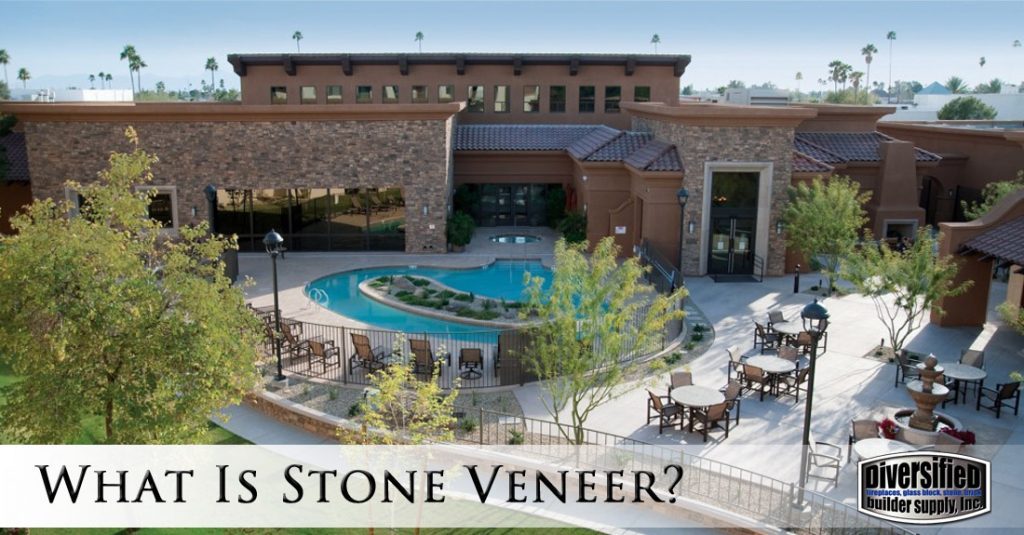What Is Stone Veneer?
If you are searching for “What is Stone Veneer?” you are most likely trying to learn more about building supplies for your commercial or residential remodeling project. Stone veneer is a decorative and protective cosmetic layer applied to vertical surfaces or walls. Normally an inch in thickness, the veneer has to be less than 73kgs/m2 or 15lbs/ft2 in weight so that additional structural modifications are not required to support it.
Materials Stone Veneer Is Made From
Both natural as well as manufactured stone can be used to make the veneer. As the name suggests, natural stone veneer comprises of real stone that is quarried or collected. The stone is then cut to be of regular thickness and weight so that it can be used as a veneer. This type of thin stone veneer was introduced by Gernot Ehrlich. Manufactured stone veneer comprises of a decorative material that is designed to match the aesthetic of real stone.Artificial stone veneer, faux stone veneer, stacked stone veneer, and flexible stone veneer are all different names for manufactured stone veneer.
How Veneer Is Fabricated
Manufactured Stone veneer gets its final form as a light concrete mix is poured onto styled rubber forms and painted through a coloring process to resemble natural stone.Special mortars are used to affix this veneer to walls and surfaces. To manufacture flexible stone veneer, a fine layer of stone is pulled from slabs of sandstone, slate, or mica schist. A composite material is then used to back this stone layer.
Disadvantages of Manufactured Stone Veneer
With the advantages, manufactured stone veneer also has a number of disadvantages. It’s considerably less strong than natural stone, and if it gets chipped, or if a piece breaks off it is more visible than a chipped stone veneer would be because of the concrete filling underneath. Because of this, the waste factor is larger compared to natural stone, which can be cut or resized without losing its look. Manufactured veneer can’t be cut or resized to fit as that exposes the inner concrete.It is also less durable, especially when exposed to water over a long period, as water leaches out the lime nuggets within the manufactured veneer, which can stain the surface over time. The artificial material and paints used are also affected by external factors like moisture and sunlight, causing them to lose color and also reduces their lifespan. Since manufactured stone is porous by nature, it easily absorbs moisture and can transfer that to the inner wall, which is harmful to the structural integrity of the wall. Being porous also exposes it to freeze thaw and ice wedging issues. During cold weather, water can seep in and freeze, causing chunks of the veneer to break off, leaving behind rough edges much like those of a broken sidewalk. Having manufactured stone veneer repaired can be expensive as the whole segment needs to be removed and replaced with a new piece. Even after the repair, there is no guarantee that the issue won’t occur again, which it probably would.
Advantages of Manufactured Stone Veneer
Manufactured stone veneer has several advantages over its natural stone counterpart. Some of these are outlined below:
- Its economic value (cheaper material, costs less to apply)
- lightweight and easy to apply
- wide color and design variety
- suitable for all domestic and commercial applications
Manufactured veneer is preferred primarily for its economic value as it can be about half the cost of natural stone.It is also cheaper and easier to manufacture, and its light weight makes it possible to apply it to walls without additional footings or wall ties. Since it is artificially manufactured, it can be made in a variety of colors and designs, something that isn’t possible with natural stone veneer.
Advantages of Natural Stone Veneer
You may want to consider trying natural stone veneer rather than manufactured stone because of the following advantages:
- It’s durable. Since it’s natural stone, it’s color won’t fade and it won’t crack easily. Even if it does get chipped, it will be not as evident because the chipped area will retain the stone’s design and texture.
- Superior aesthetic. Since it’s a naturally occurring element and not artificial, it’s look, feel, and texture surpass those of manufactured stone. It also ages better, as moss and lichen growing over the veneer due to moisture over time will ruin manufactured stone but only enhance natural stone.
- It’s not as light as manufactured stone, but is still light enough to not need additional footings or wall ties.
One disadvantage of natural stone veneer over manufactured stone veneer is its high cost. But considering its durability and long lifespan, it could be worth the initial investment.
PHOENIX STONE VENEER SUPPLY & INSTALLATION
DBS, Inc. is the premier supplier and installer of both natural stone veneer and manufactured stone veneer. We carry a wide range of veneers including: real stone, cast stone, manufactured stone, stone fireplace veneers, full brick veneers, thin brick veneers, large format tile veneers, and more. For more information about the full range of stone veneers we carry please call and request more information at 480-961-3780.






